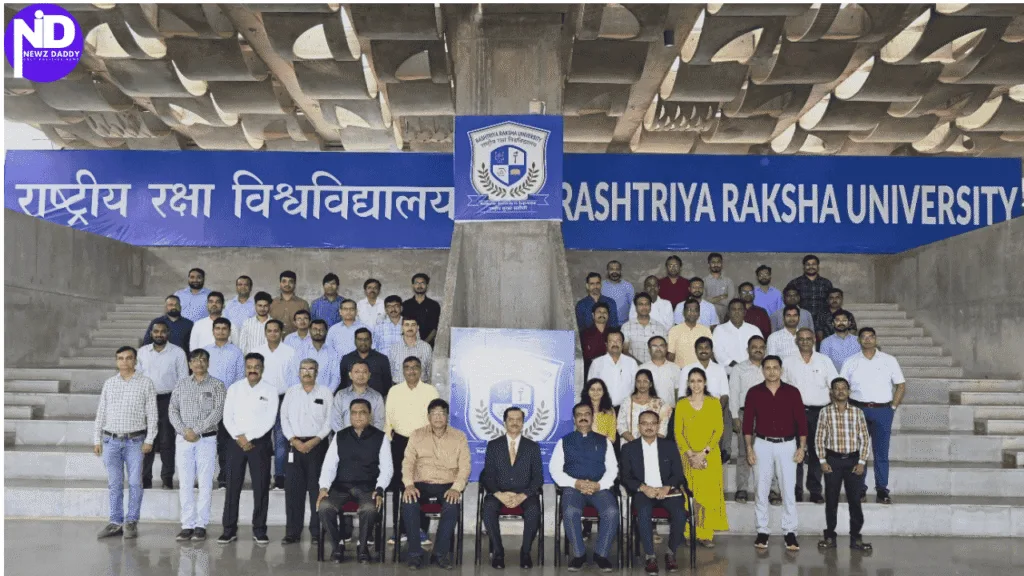RRU Empowers Power Officials Through Cybersecurity Training
Newz Daddy Educational Updates
The School of Information Technology, Artificial Intelligence, and Cyber Security (SITAICS) of Rashtriya Raksha University (RRU) launched a specialised “Sectoral Cyber Security Training” program for officers from the Ministry of Power, Government of India.
Rashtriya Raksha University is a top security university in India. It specialises in cyber security, digital forensics, and national security. The Ministry of Power is the main department in India that plans and looks after electricity in the country. This initiative underscores RRU’s commitment to enhancing national security through targeted skill development and strategic partnerships.RRU is recognised as an Institution of National Importance under the Ministry of Home Affairs and works closely with many security and police institutions
The program was meticulously designed to enhance the cyber defence readiness of India’s vital energy sector, recognising its indispensable role in national security and economic stability. The energy sector is a key part of India’s economy. It’s vital to secure critical infrastructure like power systems so that economies and homes stay safe. A strong emphasis was placed on providing practical exposure to the participants, equipping them with actionable skills to counter evolving cyber threats. Hands-on training ensures officials can actually work through problems in real time, which helps build strong and confident cyber defenders.
The program was officially inaugurated by Prof. (Dr.) Bimal N. Patel, Vice Chancellor of Rashtriya Raksha University. In his inaugural address, Prof. Patel highlighted the critical importance of international collaboration in addressing evolving cyber threats and emphasised RRU’s significant contributions to strengthening national security frameworks.
Prof. Bimal N. Patel is the Vice Chancellor of RRU. He often speaks about how important it is to work with other countries to fight cyber threats better and keep people safe. He further elaborated that RRU, through its comprehensive academic, research, and training initiatives, consistently serves as a trusted partner in advancing global cooperation against contemporary security challenges. RRU combines teaching, research, and training in one place—this trio helps build experts who can work with others around the world
This training is a testament to RRU’s dedication to equipping key government sectors with the necessary expertise to safeguard critical infrastructure, he said. Preparing government officials with cyber skills helps protect networks that run hospitals, power, and utilities. The training program at RRU underscores the growing importance of cybersecurity in critical infrastructure. The energy sector, in particular, is a prime target for cyberattacks due to its interconnectedness and the cascading effects of any disruption. Cyberattacks on energy could cause big problems—like blackouts. That is why the energy sector must be extra safe online.
By focusing on practical exposure, the curriculum aimed to bridge the gap between theoretical knowledge and real-world application, ensuring that the participating officers are well-prepared to identify, mitigate, and respond to cyber threats effectively. Learning theory is good, but knowing how to use it in a real situation makes training much stronger. This initiative is a testament to RRU’s commitment to strengthening India’s overall cybersecurity posture through specialised training and capacity building. Building capacity means improving skills and systems so India stays safe from cyber risks.
The intensive, one-week residential training program is meticulously crafted to provide participants with comprehensive exposure to key areas of cybersecurity. Residential training means the officials stay on campus—this helps them focus fully without distractions. The curriculum encompasses a wide array of essential topics, beginning with foundational elements such as Client-Side Hardening and Web Application Security, ensuring a robust understanding of common vulnerabilities and protective measures.
Client-side hardening means making browsers and computers more secure. Web application security protects websites from being hacked. Furthermore, the program delves into the intricacies of Regulatory Compliance, equipping officers with the knowledge to navigate the complex legal and policy landscape governing cybersecurity in the power sector. Knowing the rules and laws (regulations) helps workers make choices that are safe and legal in cyber environments. Advanced modules are a cornerstone of this training, featuring in-depth sessions on Network Security, crucial for safeguarding the interconnected systems of the power grid. Network security protects devices and systems that share information. The power grid is closely connected, so securing those connections is very important.
Participants will also gain hands-on experience in Digital Forensics and Incident Response (DFIR), enabling them to effectively identify, analyse, and mitigate cyber incidents. DFIR is about finding out what happened during a cyberattack and responding quickly and correctly. The curriculum extends to specialised areas like Malware Analysis, providing insights into the detection and neutralisation of malicious software, and Security Information and Event Management (SIEM), which is vital for real-time threat monitoring and analysis. Malware analysis helps find harmful programs, and SIEM lets defenders see threats as they happen.
The program also covers Intrusion Detection Systems (IDS), a key component in identifying unauthorised access and malicious activities within networks. IDS watches network traffic and flags things that look wrong—like someone breaking in. A particularly significant aspect of the training focuses on Operational Technology (OT) and OT Security, ensuring that officers are equipped with the knowledge and skills to protect industrial control systems and power sector networks against emerging cyber threats. OT refers to machines and systems that control various components, such as power plants or machinery. These require special security measures to keep physical equipment safe.
This initiative not only enhances the technical expertise of the Ministry of Power officials but also significantly contributes to building a resilient cybersecurity culture within the Ministry, thereby strengthening the nation’s critical infrastructure against increasingly sophisticated cyberattacks. Cybersecurity culture means everyone cares about safety. Training officials help build that culture across the Ministry.
Must Read:
RRU Leads Anti-Money Laundering Effort for Palestine
International Training Program On Combating Financial Crimes At RRU

